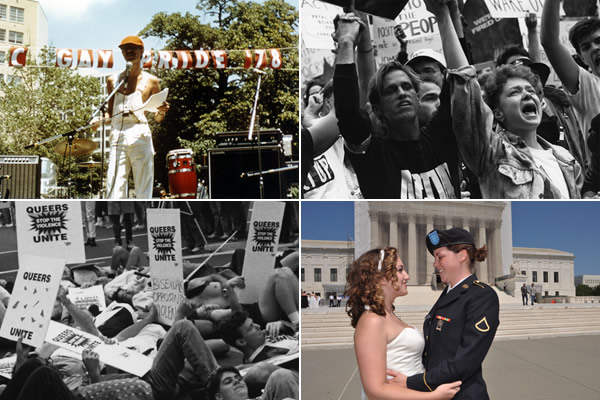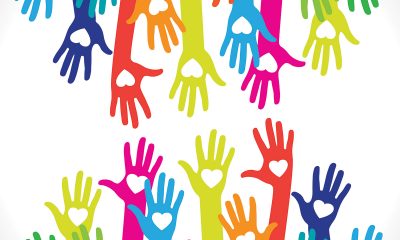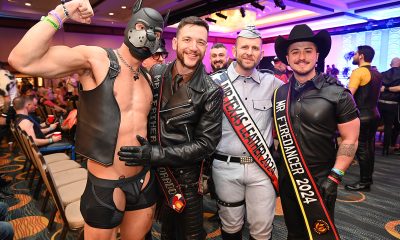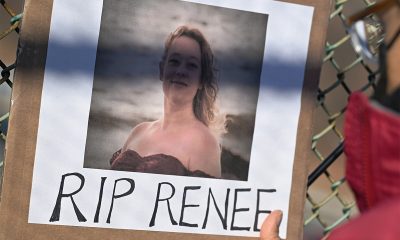a&e features
Top 45 headlines of the Blade’s 45 years
The biggest LGBT stories, from DOMA to ‘Will & Grace’
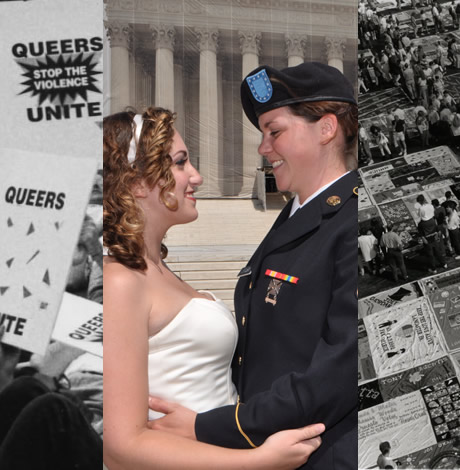
To help commemorate the Blade’s 45th anniversary, the editorial staff worked to identify the top 45 headlines from our archives.
These headlines often represent single events, but sometimes are used thematically to encompass a series of related events. Each one survived several rounds of voting to make the cut and determine its order in the final list.
The stories are a mix of local and national events that helped shape the LGBT movement.
45. 2013: Former Washington Wizards center Jason Collins in April became the first male athlete who actively plays in a major American professional sports league to come out as gay. The watershed announcement prompted other athletes to declare their sexual orientation. These include former University of Missouri defensive end Michael Sam who came out in February and was drafted by the NFL’s Rams.
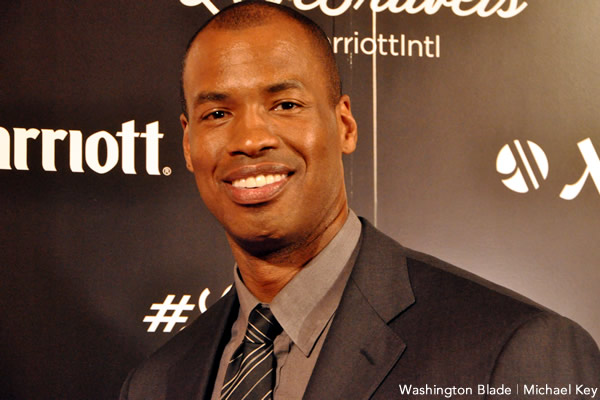
Jason Collins (Washington Blade photo by Michael Key)
44. 1982: An investigation by the Washington Blade reveals that the FBI is spying on D.C. gays. Sources said the FBI and D.C. police were looking into prostitution with adults or minors, the sale and distribution of child pornography and possible infiltration by foreign intelligence agents. The Blade, which interviewed more than 25 people to verify that the investigation was taking place, found that D.C. gay bars, bar owners and some patrons were under surveillance. Spokespeople for the D.C. police and the FBI denied that gays were being singled out for different treatment.
43. 1998: “Will & Grace” debuts in September, marking a significant change in Hollywood’s presentation of LGBT people, their lives and relationships. The sitcom featured Will Truman, a gay lawyer living in New York City, and his straight friend and roommate Grace Adler, an interior designer. Storylines in the comedy involved Will and Grace’s problems seeking romantic relationships as well as struggles in maintaining their own friendship. The most successful TV series featuring gay characters, “Will & Grace” ran for eight years, earned 16 Emmys and made it into the Nielsen Top 20 for half of its network run.
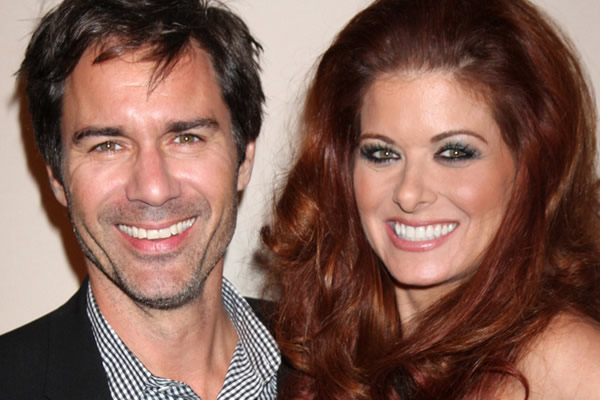
Eric McCormack and Debrah Messing of ‘Will & Grace.’
42. 1992: In October, more than 500,000 people come to see the NAMES Project’s AIDS Memorial Quilt on the National Mall. The 23,000 panels on display covered more than 15 acres around the Washington Monument, and the Quilt included panels from every state and 28 countries. The Quilt was displayed for the first time on the National Mall in 1987, during the National March on Washington for Lesbian & Gay Rights. In January of 1993, the NAMES Project was invited to march in President Clinton’s inaugural parade.
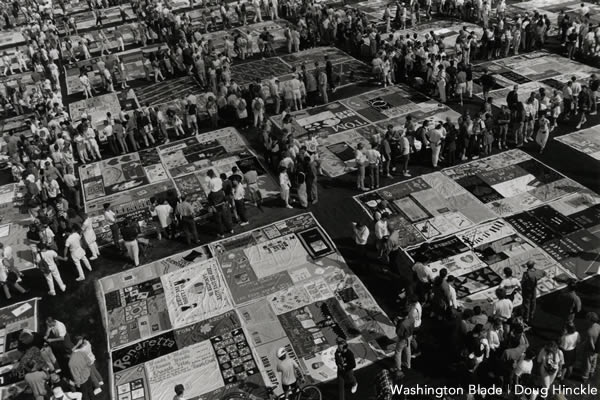
Names Project Quilt on Oct. 10, 1992. (Washington Blade archive photo by Doug Hinckle)
41. 1991: The country’s first Black Gay Pride Day is held in Washington drawing 800 participants. Activists Welmore Cook, Theodore Kirkland and Ernest Hopkins organized the event in response to their concern of supporting the increasing number of HIV-positive black people in the District. The event raised nearly $3,000 for AIDS charities with the support of the D.C. Coalition of Black Lesbians & Gay Men and the Inner City AIDS Network.

Black Gay and Lesbian Pride Day in 1991. (Washington Blade archive photo by Doug Hinckle)
40. 1976: Former nun-turned-gay rights activist Jean O’Leary is elected as the first openly gay delegate to the 1976 Democratic National Convention. O’Leary, who started the Lesbian Feminist Liberation in 1972 and co-founded National Coming Out Day in 1987, was also the organizer of the first meeting of gay rights activists in the White House under President Carter in 1977. O’Leary continued to serve on the Democratic National Committee for 12 years after she became a delegate.
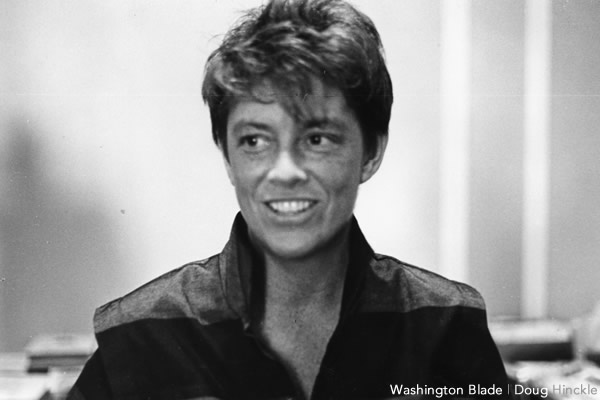
Jean O’Leary (Washington Blade archive photo by Doug Hinckle)
39. 2008: After running a largely gay-friendly campaign, Barack Obama is elected as the nation’s first black president. He frequently pledged during the campaign to seek “equality for all,” vowing to fight for full federal recognition of same-sex couples and develop a comprehensive national HIV/AIDS strategy, among other steps. But in the months following his inauguration, Obama drew criticism from some activists for not doing more to advance LGBT priorities in Congress.
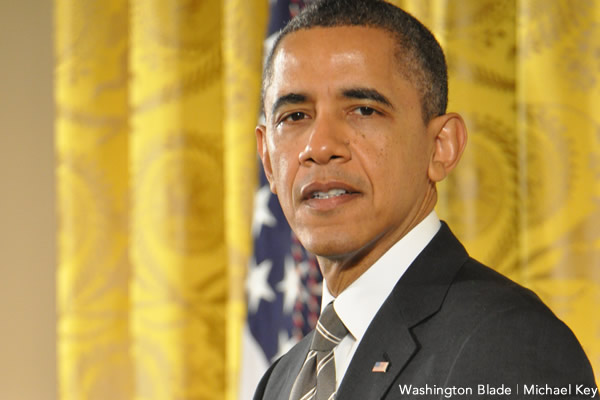
President Barack Obama (Washington Blade file photo by Michael Key).
38. 1973: D.C. Mayor Walter Washington signs into law Title 34, which bans discrimination on the basis of sexual orientation in housing, public accommodations, bank credit and employment. The law also banned discrimination on the basis of marital status and personal appearance. It narrowed the “business necessity” exclusion, which said that businesses would have to prove that practicing nondiscrimination would cost them money and render it impossible to remain in business at all in order to ignore the law.
37. 2011: Franklin E. Kameny, who is credited with playing the lead role in establishing an assertive and credible civil rights movement for lesbians and gays in the early 1960s and who coined the phrase “Gay is Good,” died at his home in Washington, D.C. on Oct. 11 at the age of 86. His voluminous papers chronicling his gay and later LGBT rights work covering the repeal of sodomy laws, allowing gays and lesbians to serve in the military, and the enactment of local and state laws banning LGBT discrimination, among many other efforts, are available for scholars and researchers at the Library of Congress.
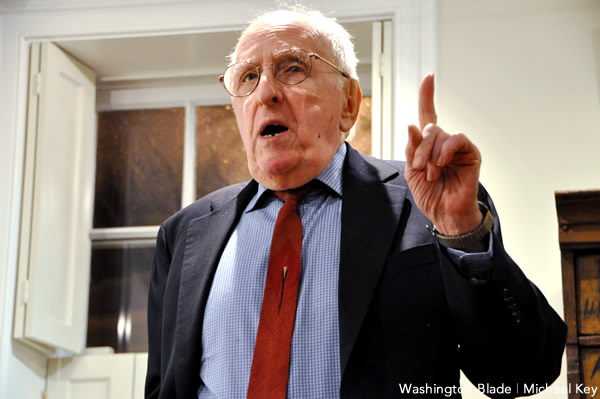
Frank Kameny (Washington Blade file photo by Michael Key)
36. 2004: On Nov. 2, voters in 11 states vote overwhelmingly in support of state constitutional amendments prohibiting same-sex unions. The development came after two other states voted earlier in the year to add constitutional amendments banning gay marriage. President George W. Bush also supported that year the Federal Marriage Amendment, but his endorsement did not rally sufficient support to pass the measure through Congress. The amendment stalled in the U.S. Senate, and was rejected outright in the U.S. House.
35. 1988: About 1,100 AIDS activists, angry at the Food & Drug Administration for taking too long to approve new drugs for people with AIDS, stage a protest at FDA headquarters and close it for the day. Protesters sat or sprawled on the pavement outside the building’s main entrance, preventing employees from entering or leaving. Some demonstrators, who climbed onto an overhanging roof above the building’s main entrance, attached placards and banners proclaiming “silence = death” and “test drugs, not people” to office windows. The demonstration resulted in 176 arrests.
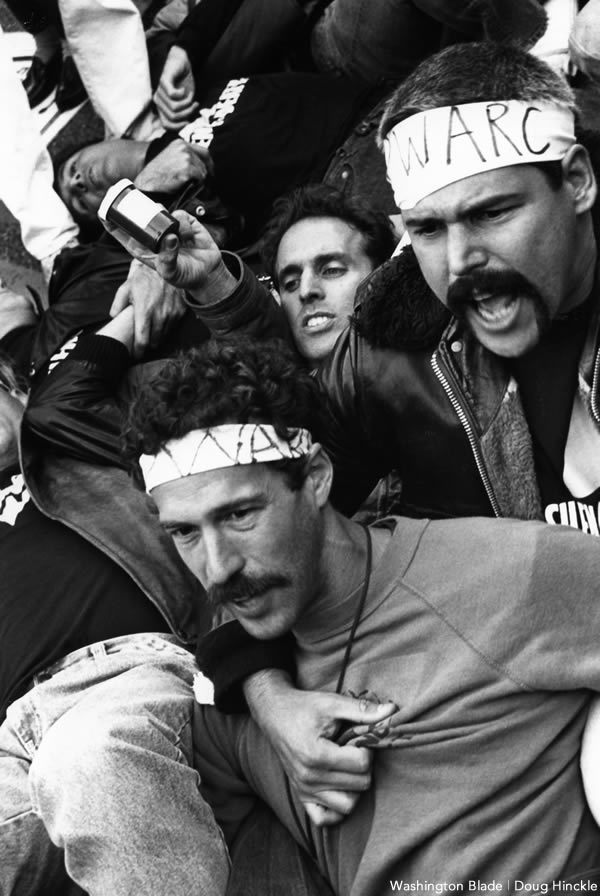
Civil disobedience at the FDA on Oct. 11, 1988. (Washington Blade archive photo by Doug Hinckle)
34. 1987: The Second National March on Washington for Lesbian & Gay Rights draws between 200,000 and 600,000 participants. In addition to demanding civil rights, participants also called on President Ronald Reagan to take greater action to confront the growing AIDS epidemic. The event included the unveiling of Cleve Jones’ NAMES Project AIDS Memorial Quilt and a protest before the Supreme Court building for its 1986 ruling upholding sodomy laws. Speakers included Latino civil rights leader Cesar Chevez; comedian Whoopi Goldberg; and Jesse Jackson, then a Democratic presidential contender.
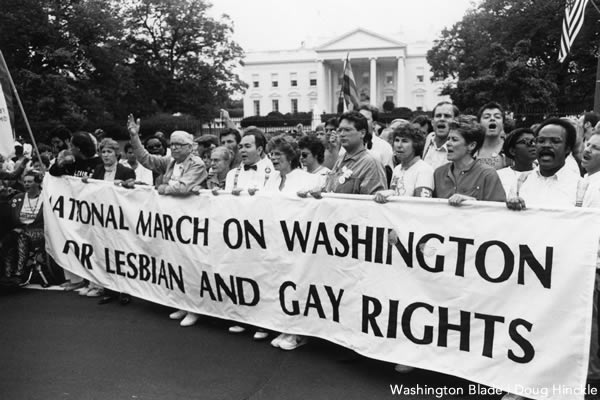
The National March on Washington for Lesbian and Gay Rights on Oct. 14, 1987. (Washington Blade archive photo by Doug Hinckle)
33. 1980: Gay activist Mel Boozer becomes the first openly gay person to have his name placed in nomination as a candidate at the Democratic National Convention. Supporters named Boozer, then a president of the Gay Activists Alliance, as a vice presidential candidate. Boozer, who was black, also addressed the convention during primetime. “I know what it means to be called a ‘nigger’ and I know what it means to be called a ‘faggot,’ and I understand the differences in the marrow of my bones. And I can sum up that difference in one word: none.”
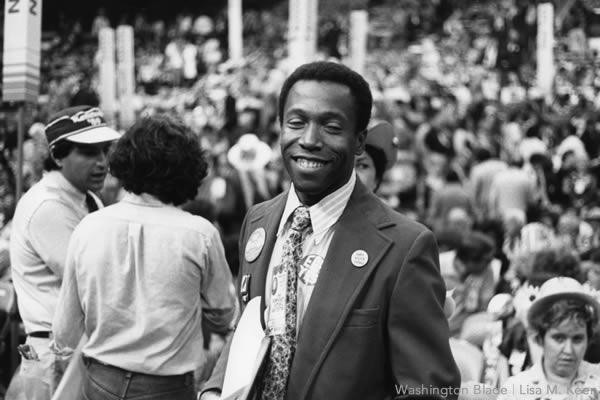
Mel Boozer on the floor of the Democratic National Convention on Aug. 13, 1980. (Washington Blade archive photo by Lisa M. Keen)
32. 1986: The U.S. Supreme Court ruled in Hardwick v. Bowers that homosexual activity is not protected by the Constitution. The court upheld a Georgia sodomy law that criminalized oral and anal sex in private between consenting adults, and said that “majority belief that sodomy is immoral” was sufficient reason to validate sodomy laws. The issue in the case was the right of privacy, and the court ruled that the Constitution’s 14th Amendment right did not extend to private, homosexual conduct.
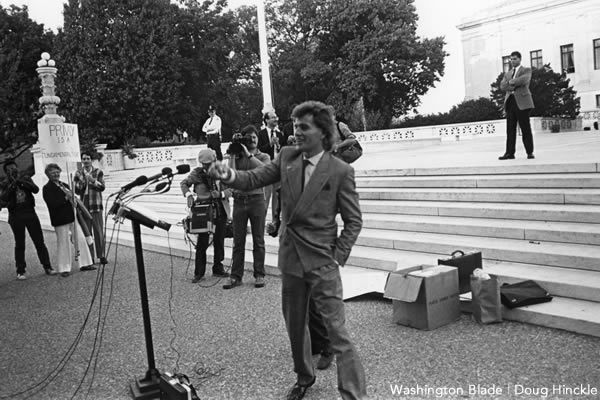
Michael Hardwick in front of the Supreme Court on Oct. 8, 1986. (Washington Blade archive photo by Doug Hinckle)
31. 1983: Gay leaders, independent medical researchers and health and social service agency officials testify before a congressional panel that the federal government’s response to AIDS had been too little, too late. Organizations such as the National Gay Task Force called on the federal government to give substantial funding to AIDS research and create a commission specifically designed to fight the AIDS epidemic. Several witnesses echoed the plea, alleging that the lack of resources had already cost researchers the ability to study the first generation of AIDS cases.
30. 1993: On April 25, the March on Washington for Gay, Lesbian & Bi Equal Rights & Liberation drew an estimated 750,000 participants to Washington. The political rally drew more mainstream media coverage — including a Newsweek cover story — and more participants than previous marches. Protesters also took part in more than 250 march-related events, including conferences, workshops, lobbying events and religious ceremonies.
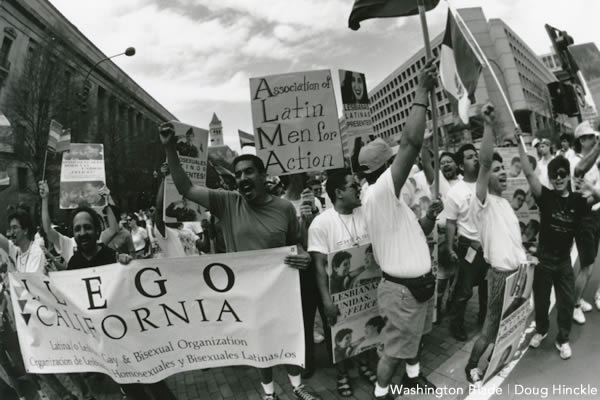
National March on Washington for Lesbian, Gay and Bisexual Rights and Liberation on April 25, 1993. (Washington Blade archive photo by Doug Hinckle)
29. 1982: Wisconsin Gov. Lee Dreyfus signs into law the nation’s first statewide gay civil rights bill, making it illegal in the Badger State to discriminate on the basis of sexual orientation in housing, employment and public accommodations. “There are some questions the government has no business asking,” Dreyfus said of the bill.
28. 2012: U.S. Rep. Tammy Baldwin (D-Wisc.) made history in November when she became the nation’s first out lesbian or gay person to win election to the United States Senate. Her decisive victory over Republican Tommy Thompson, the state’s former governor, solidified Baldwin’s status as a popular and respected public official with strong support from gay and straight voters alike.
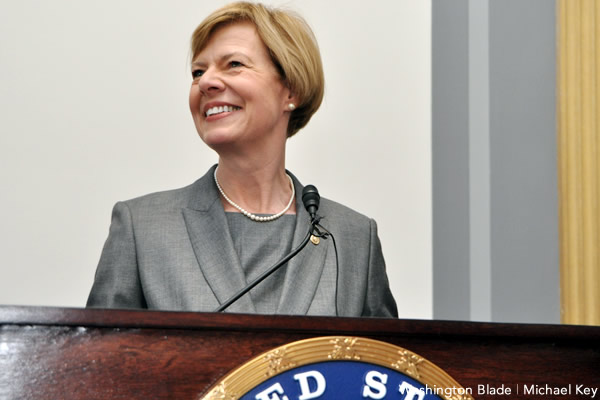
Sen. Tammy Baldwin (D-Wis.) (Washington Blade photo by Michael Key)
27. 1979: On Oct. 14, tens of thousands of people participate in the National March on Washington for Lesbian & Gay Rights. It was the first such march on Washington. Among the many participating groups were the National Gay Task Force, the Gertrude Stein Democratic Club, and the D.C. Area Feminist Alliance. In the days following the march, activists from across the country descended upon Capitol Hill to speak to lawmakers about anti-discrimination laws.
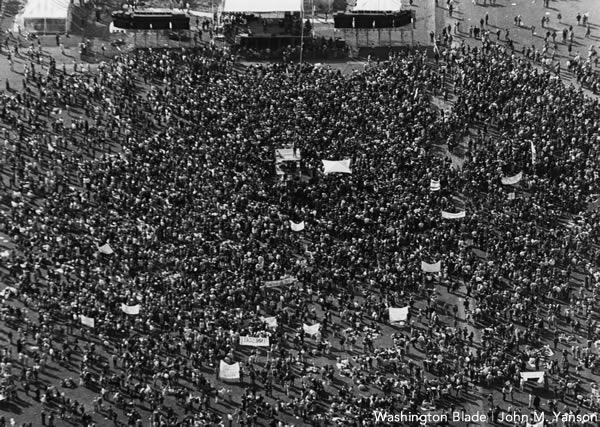
National March on Washington for Lesbian and Gay Rights on Oct. 14, 1979. (Washington Blade archive photo by John M. Yanson)
26. 1985: In late July, actor Rock Hudson issues a statement saying he has AIDS and is receiving treatments in Paris that are unavailable in the U.S. He died three months later at age 59. His announcement and death drew massive mainstream media attention to AIDS, and numerous AIDS fundraisers ensued to help fund research, treatment and services for people with AIDS. Actress Elizabeth Taylor, a friend of Hudson’s, went on to start an AIDS fundraising organization, the American Foundation for AIDS Research.
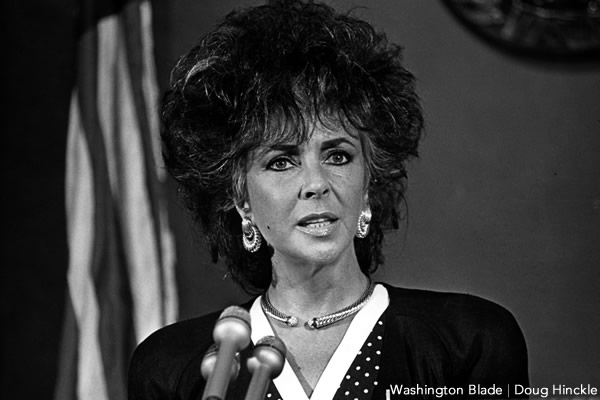
Elizabeth Taylor (Washington Blade archive photo by Doug Hinckle)
25. 1997: Actress Ellen DeGeneres comes out in an article in the April 17 issue of Time magazine. The headline: “Yep, I’m Gay.” Her alter ego, Ellen Morgan, also came out in the April 30 episode of “Ellen,” becoming the first gay lead character on television. The hour-long episode featured Laura Dern as Ellen’s romantic interest; Oprah Winfrey played a therapist who assured Ellen that there’s nothing wrong with being gay.
24. 2007: A debate raged among LGBT activists over how to best advance LGBT rights after the U.S. House of Representatives passed an Employment Non-Discrimination Act that lacked explicit protections for transgender people. Rep.Tammy Baldwin (D-Wis.), a lesbian, introduced an amendment to add a trans provision to the bill, but withdrew it before a vote. Her move was considered a symbolic gesture to assure trans people they were not forgotten. The bill passed the House, 235-184, but after President Bush threatened a veto, the Senate failed to take up the measure.
23. 2012: The American Psychiatric Association on Dec. 2, removed Gender Identity Disorder from its list of mental disorders. The organization specifically removed GID from its Diagnostic and Statistical Manuel (DSM) of Mental Disorders and replaced it with Gender Dysphoria. The process to revise the DSM began more than a decade earlier.
22. 2009: Throughout the year, more same-sex couples win the right to marry. The Iowa Supreme Court unanimously strikes down the state’s ban on same-sex marriage; Vermont becomes the first state to legalize same-sex marriage via the legislative path after it overrides Gov. Jim Douglas’s veto; Maine lawmakers followed, with Gov. John Baldacci signing the bill; and New Hampshire becomes the sixth state to legalize same-sex marriage.
21. 2013: More states begin to legalize same-sex marriage in the aftermath of the Supreme Court’s decision striking down DOMA. Marriage laws in Rhode Island and Hawaii took effect on Aug. 1, 2013, and Dec. 2, 2013, respectively. Illinois’ same-sex marriage law took effect statewide on June 1. Gays and lesbians also gained marriage rights in New Mexico, Oregon and Pennsylvania since the DOMA decision.
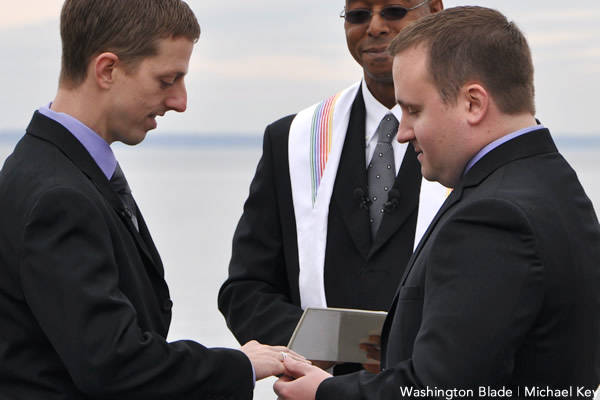
(Washington Blade file photo by Michael Key)
20. 1996: At the 1996 International Conference on AIDS in Vancouver, it’s announced that HIV/AIDS cocktails, three-drug combinations used to combat the disease, held promise in combating symptoms. The introduction of the cocktails fundamentally changed the way AIDS was perceived, shifting it away from an inevitably fatal disease to one that, while chronic, was more manageable. The cocktails showed promise in blood tests of people with access to the drugs even though the number of available cocktails was limited at the time.
19. 1982: Gay Related Immune Disorder, or GRID, becomes the first name to describe what now is known as AIDS. Cases reached epidemic proportions, moving beyond clusters of gay men in New York and San Francisco and into groups with no obvious risk factors. Scientists later agreed that Acquired Immune Deficiency Syndrome more accurately described the disease, which did not exclusively affect gay men. In 1984, government researchers identify what they believe is the “probable cause” of AIDS: HTLVIII, the Human T-cell Leukemia Virus. In June 1988, the Presidential Commission on the Human Immunodeficiency Virus Epidemic, a 13-member panel, released a comprehensive report of 583 recommendations to address the AIDS epidemic.
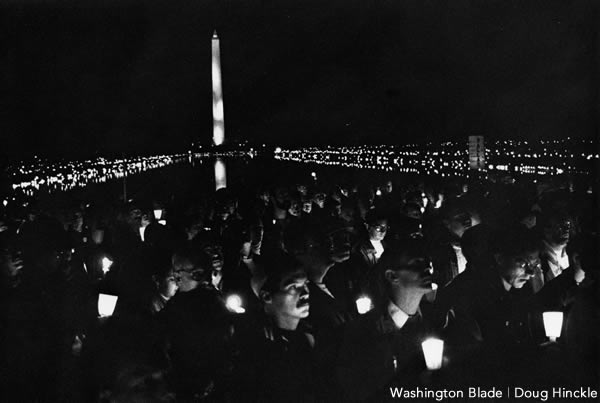
(Washington Blade archive photo by Doug Hinckle)
18. 1993: President Clinton angers gays across the country when he backs off his campaign promise to end the ban on gays in the military, instead endorsing a policy by Sen. Sam Nunn (D-Ga.). Supporters touted the law — which became known as “Don’t Ask, Don’t Tell” — as a compromise because it would allow gays to serve in the military provided that they didn’t disclose their sexual orientation. Under the policy, about 13,000 service members were discharged, some because their sexual orientation was disclosed by others to commanding officers.
17. 1996: The Defense of Marriage Act abruptly surfaces in May before quickly working its way through Congress and winning President Clinton’s signature in September. The law prohibits the federal government from recognizing same-sex marriage, and allows states not to recognize same-sex unions performed in other states. Same-sex marriage was not legal anywhere in the U.S. when Clinton signed DOMA into law, but now marriage rights for gay couples are available in six states. Because of DOMA, legally married same-sex couples in these states aren’t eligible for federal benefits.
16. 1970: A crowd of 2,000 gay demonstrators in New York commemorates the first anniversary of the Stonewall Riots with a march and rally. The event, known as Christopher Street Liberation Day, occurred June 28 and reportedly took up about 15 blocks of the street. The New York Times reported there was little animosity, and “some bystanders applauded when a tall, pretty girl carrying a sign ‘I am a Lesbian’ walked by.” Pride marches took place simultaneously in Los Angeles and Chicago.
15. 2009: Mayor Adrian Fenty on Dec. 18 signed a bill approved days earlier by the D.C. City Council in an 11-2 vote legalizing same-sex marriage in the nation’s capital. The legislation successfully cleared a required legislative review by Congress and withstood efforts by opponents who attempted unsuccessfully to require that it come before voters in a referendum. The Religious Freedom and Civil Marriage Equality Amendment Act of 2009 took effect March 3, 2010.
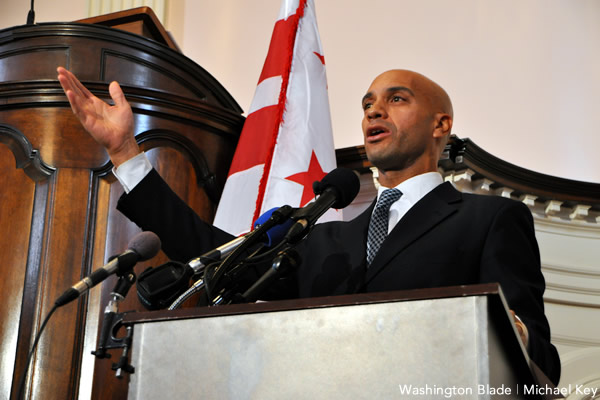
Mayor Adrian Fenty at the same-sex marriage bill signing. (Washington Blade photo by Michael Key)
14. 2012: Same-sex marriage laws were upheld at the ballot box for the first time. Voters in Maryland, Maine and Washington on Nov. 6 backed gay nuptials statutes in their respective states. Minnesotans on the same day rejected a proposed state constitutional amendment that would have defined marriage as between a man and a woman.
13. 2008: In May, a California Supreme Court ruling legalizes same-sex marriage in the state. Later that year, the Connecticut Supreme Court rules similarly. A ballot initiative to overturn the California ruling was put to voters on Election Day in November. Following an expensive campaign funded largely by the Mormon Church and anti-gay groups such as Focus on the Family, California voters passed Proposition 8, which rescinded same-sex marriage rights in the state.
12. 1977: In June, singer Anita Bryant leads a highly publicized campaign to repeal a gay civil rights ordinance in Dade County, Florida. The ordinance made it illegal to discriminate on the basis of sexual orientation in housing, employment, loans and public accommodations. Bryant founded Save Our Children to protest the ordinance and she led several more campaigns around the country to repeal other local anti discrimination ordinances. A boycott was organized against the Florida Citrus Commission, who used Bryant in advertising. Bryant’s campaign in Dade County was overturned in 1998.
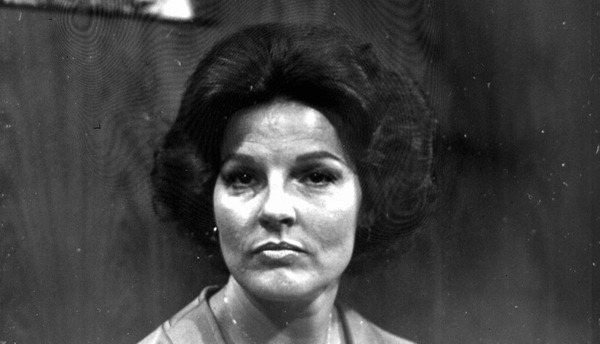
Anita Bryant (Photo public domain)
11. 1974: U.S. Reps. Bella Abzug and Edward Koch, Democrats from New York, introduce the Equality Act of 1974.The bill would have added “sexual orientation” to the 1964 U.S. Civil Rights Act, making it illegal to discriminate against gays and lesbians in employment, housing and public accommodations. The Equality Act, the first federal legislation in support of gay rights, never passed.
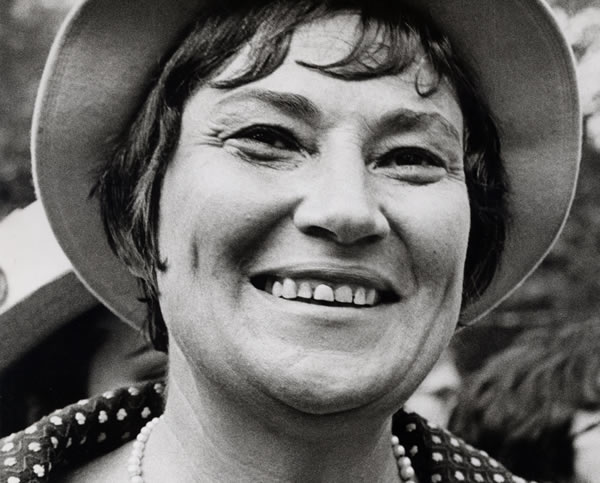
Rep. Bella Abzug (D-N.Y.) (Photo public domain)
10. 2009: Eleven years after the murder of the gay college youth for whom the bill was partly named, President Obama signed into law the Matthew Shepard & James Byrd, Jr. Hate Crimes Prevention Act. It was the first time federal protections for the LGBT community were enshrined into U.S. code. Byrd, a black man, was dragged to death behind a truck in 1998 by three white men in Texas.
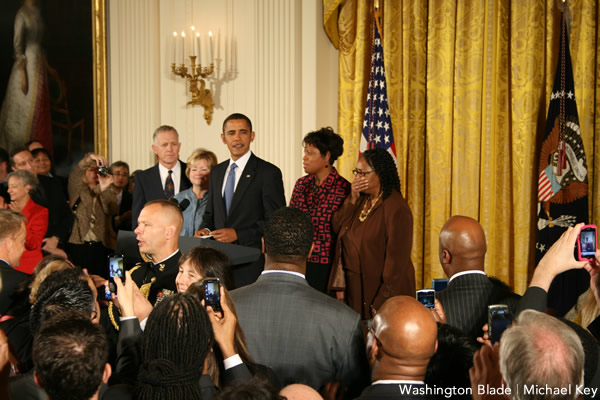
Signing of the Matthew Shepard and James Byrd Hate Crimes Prevention Act in 2009. (Washington Blade photo by Michael Key)
9. 1998: Matthew Shepard, a gay college student, is tortured and left to die near Laramie, Wyo., in October. He was found tied to a fence and was brought to a hospital, where he later died. The killers were sentenced in April 1999 and November 1999 to life in prison. Grief following his death led to the introduction of federal legislation that would enable the Justice Department to prosecute hate crimes against LGBT people. The bill languished in Congress for years before becoming law (see number 10).
8. 2010: After nearly two years of struggles in Congress, President Obama signed legislation known as the “Don’t Ask, Don’t Tell” Repeal Act to lift the U.S. military’s ban on openly gay service. The armed forces discharged more than 13,000 service members under the law before it was formally lifted one year later.
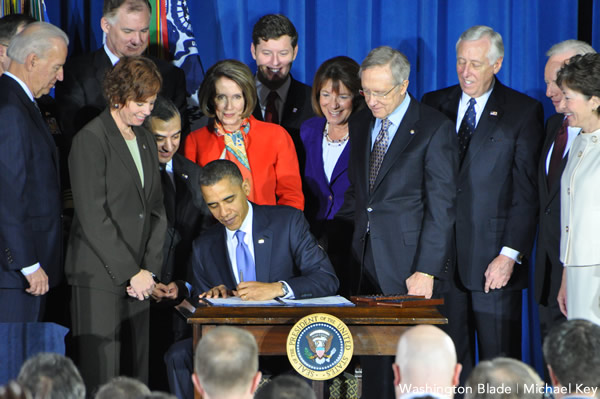
President Obama signed the repeal of ‘Don’t Ask, Don’t Tell’ in December 2010, but it didn’t take effect until September 2011. (Washington Blade photo by Michael Key)
7. 2003: On June 26, the U.S. Supreme Court rules in Lawrence v. Texas that sodomy laws are unconstitutional. In 1998, John Lawrence and Tyron Garner were arrested in Lawrence’s Houston home and jailed overnight after officers responding to a disturbance report found the men having sex. The court voted 6-3 to strike down the law, and the opinion covered similar laws in 12 other states. With its decision, the court also reversed Bowers v. Hardwick, its 1986 decision that upheld Georgia’s sodomy law on the argument that it had been harmful to gay people’s struggles for liberty and equality.
6. 2012: Ending the evolution he started 18 months earlier, President Obama announced during a TV interview with then-closeted ABC anchor Robin Roberts that he supports marriage rights for same-sex couples. Obama made history by winning re-election just six months after taking that position in a race against Mitt Romney, who remained opposed to marriage equality.
5. 1978: San Francisco City Supervisor Harvey Milk is gunned down by Supervisor Dan White, who also shoots and kills Mayor George Moscone. Milk, who was gay and a pioneer for LGBT rights, in 1978 helped to defeat the Briggs Initiative, which would have prevented gays from working as teachers in California. On the day of his assassination, U.S. Sen. Dianne Feinstein, then the president of the Board of Supervisors, heard gunshots and called police, found Milk’s body and announced the news to the media. A candlelight vigil to the City Hall of between 25,000 and 40,000 marchers followed the assassination. More than 2,000 angry gay demonstrators protested the 1979 sentence of voluntary manslaughter of Dan White on May 21.

Harvey Milk (Photo by Daniel Nicoletta; courtesy Wikimedia Commons)
4. 1981: It is reported that an estimated 170 gay men have succumbed to a rare pneumocystis carinii pneumonia and Kaposi’s sarcoma over the preceding two years. The U.S. Centers for Disease Control issued reports on three studies that cited a serious malfunctioning of the body’s immune systems in these cases. By December, 43 percent of those infected with either pneumocystis or Kaposi’s had died. The reports were the nation’s first indication of the coming HIV/AIDS epidemic.
3. 2003: The Massachusetts Supreme Court rules in November that same-sex marriage is legal, making the Bay State the first in the country to grant marriage rights to gay couples. In its ruling for the case, known as Goodrich v. Department of Public Health, the court specified state law prohibited gays from marrying and gave state lawmakers 180 days to take appropriate action to address the issue. Then-Gov. Mitt Romney ordered town clerks to begin issuing marriage licenses to same-sex couples.
2. 1973: The American Psychiatric Association in December resolves that homosexuality should no longer be considered a mental disorder. Officials rendered the decision after intense lobbying from gays, including veteran activist Frank Kameny, as well as an endorsement from all 68 district branches of the APA. The new resolution — adopted by 13 members of the APA Board of Trustees with two remaining members abstaining — called for an end to discrimination and repeal of sodomy laws throughout the country. The National Gay Task Force at the time called the decision “an instant cure.”
1. 2013 & 2014: The U.S. Supreme Court issued its most historic rulings on LGBT rights to date. First, in 2013, by striking down Section 3 of the Defense of Marriage Act and issuing a decision restoring marriage equality to California after passage of Proposition 8. Same-sex marriage returned to the largest state in the nation, and for the first time, federal benefits began to flow to married same-sex couples. Then, just this week, the court declined to hear marriage cases from five states, instantly bringing marriage equality to Virginia, Utah, Oklahoma, Indiana and Wisconsin.
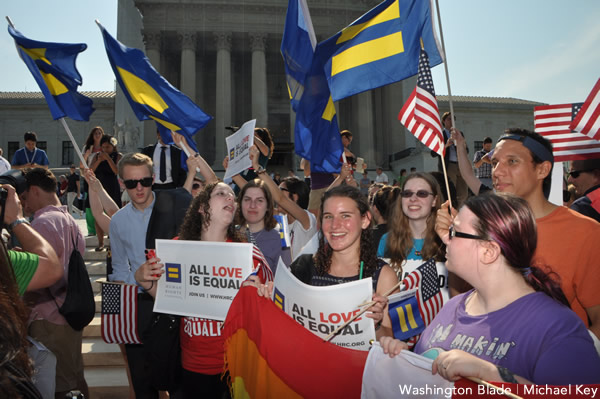
(Washington Blade file photo by Michael Key)
a&e features
Visible and unapologetic: MAL brings the kink this weekend
Busy lineup includes dances, pups, super heroes, and more
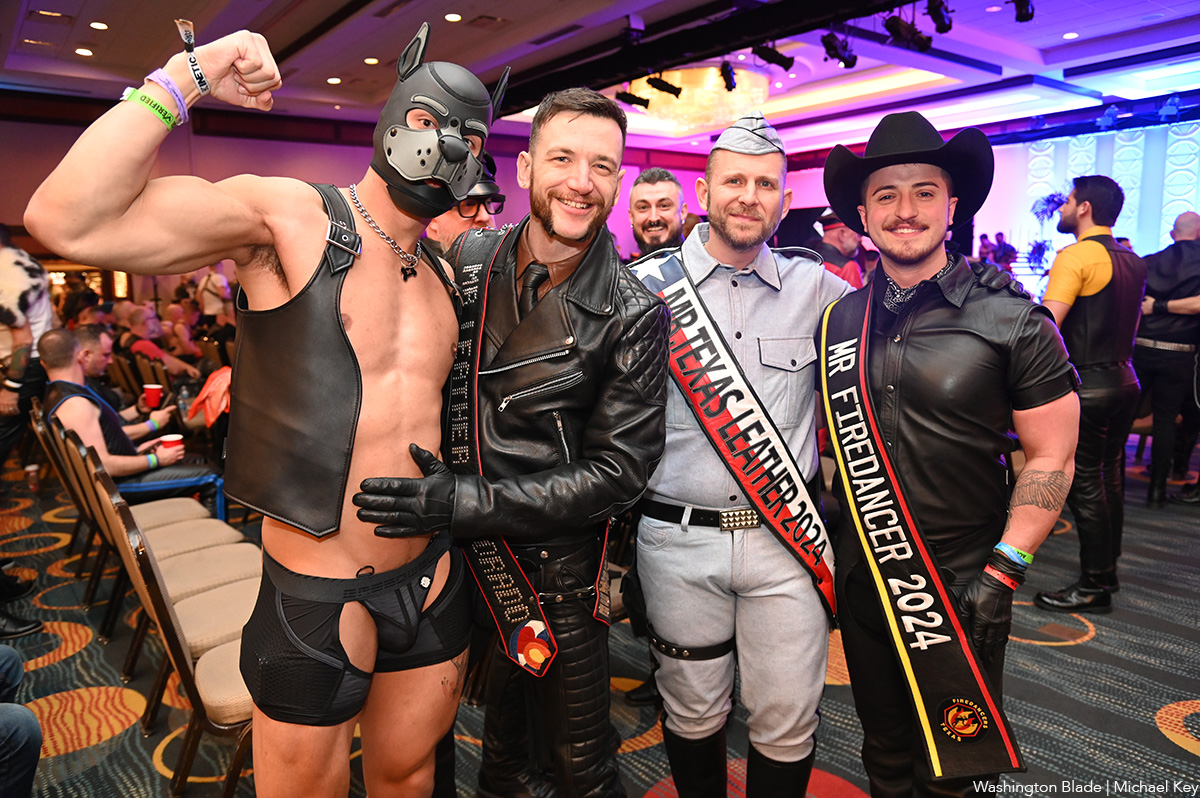
MLK Weekend in D.C. brings the annual Mid-Atlantic Leather (MAL) Weekend. Just a short walk from where Congress has been attacking queer Americans this year, MAL takes place at the Hyatt Regency Washington for several days of intrigue, excitement, leather, and kink.
The Centaur Motorcycle Club — one of several similar groups dedicated to leather in the country — has been hosting MAL in its current form for more than 40 years. Originally a small gathering of like-minded people interested in the leather lifestyle, MAL has grown to include a full four days of events, taking place onsite at the Hyatt Regency Washington (400 New Jersey Ave., N.W.). Select partner happenings take place each night, and many more non-affiliated events are scattered across the DMV in honor of and inspired by MAL.
MAL Weekend has become an internationally renowned event that celebrates fetish culture, yet it also raises funds for LGBTQ organizations, “reinforcing its legacy as both a cultural and philanthropic cornerstone of the global leather community,” according to MAL organizers.
During the day, MAL events at the Hyatt include workshops, social gatherings, shopping, and other in-person engagements for the community.
“The Hyatt underwent an extensive top to bottom renovation after last year’s event,” says Jeffrey LeGrand-Douglass, the event chair. The lobby, meeting spaces, guest rooms, and other areas have been updated, he notes, “so I am very excited for our guests to experience the new design and layout for the first time. And of course as with every year, we look forward to the contest on Sunday afternoon and seeing who will become our new Mr. MAL.”
In the evening, MAL hands the reins to partner KINETIC Presents, the D.C.-based nightlife production company. KINETIC will host four consecutive nights of high-production events that fuse cutting-edge music, immersive environments, and performance. This year, KINETIC is popping open doors to new-to-MAL venues, international collabs, play zones, and a diverse lineup.
According to KINETIC managing partner Zach Renovátes, 2026 is the most extensive MAL production to date. “The talent lineup is unreal: an all-star roster of international DJs, plus drag superstar performances at the Saturday main event,” he says.
Renovátes added that he’s “most excited about the collaborations happening all weekend — from bringing in MACHO from WE Party Madrid, to teaming up with local leather groups, to nonprofit partners, and Masc Diva [a queer nightlife collective].”
Official MAL events begin on Thursday with the Full Package/Three Day Pass Pick-Up from 5:30-8:30 p.m. at the Hyatt.
Thursday night is also the KINETIC kickoff party, called LUST. Running 10 p.m. – 3 a.m., it’s being held at District Eagle. DJ Jay Garcia holds it down on the first floor, while DJ Mitch Ferrino spins in the expansive upstairs. LUST features special performances from the performers including Serg Shepard, Arrow, Chase, and Masterpiece.
Renovátes notes that the LUST opening party at District Eagle coincides with the bar’s grand re-opening weekend. The bar will unveil its new permanent home on the renovated second floor. “it felt like the perfect place to start Mid-Atlantic Leather weekend — right in D.C.’s only dedicated home for kink communities,” he says.
After Thursday night, Friday is when daytime events begin at the Hyatt. The Exhibit Hall, on the ballroom level below the lobby, hosts upwards of 30 vendors, exhibitors, and booths with leather goods, fetish wear, clothes, toys, other accessories, providing hours of time to shop and connect with attendees and business owners. The Exhibit Hall will be open on Friday from 4-10 p.m., as well as on Saturday and Sunday afternoons.
DC Health is once again back at MAL, to provide preventative health services. In the past, DC Health has provided MPox vaccines, Doxy PEP, HIV testing, Narcan kits, and fentanyl test strips. This booth will be open on Friday 4-10 p.m.
Later, at 6 p.m., the Centaur MC is holding its welcome reception on the ballroom floor. After the Centaur’s Welcome Reception, the MIR Rubber Social is 8-11 p.m. A Recovery Meeting is scheduled at 10 p.m.
Many attendees enjoy visiting the guest room levels of the hotel. Note that to get in an elevator up to a hotel room, a staff member will check for a hotel room wristband. Non-registered guests can only access host hotel rooms if they are escorted by a registered guest with a valid wristband. Registered guests are permitted to escort only one non-registered guest at a time. Non-registered guests with a wristband who are already in the hotel before 10 p.m. may remain until midnight. However, non-registered guests without a wristband will not be admitted after registration closes.
Friday night, for the first time, KINETIC Presents is joining forces with WE Party to bring MACHO to Washington, D.C. This official MAL Friday event delivers two stages and two genres. On the UNCUT XXL stage, international Brazilian circuit superstars Erik Vilar and Anne Louise bring their signature high-energy sound. On the MACHO stage, Madrid’s Charly is joined by Chicago’s tech-house force, Karsten Sollors, for a blend of techno and tech house. UNCUT also features the XL Play Zone, a massive, immersive space exclusive to this event. The party takes place at the Berhta space from 10 p.m.-4 a.m..
“This year we’re bringing back the two-room format we debuted at WorldPride for both Friday and Saturday, so attendees can really tailor their experience — whether they’re in the mood for circuit or tech house.” says Renovátes.
Directly after Friday’s UNCUT XXL, UNDERWORLD Afters takes over District Eagle, from 3:30-8 a.m. International DJ Eliad Cohen commands the music.
Saturday, the Exhibit Hall opens earlier, at 11 a.m.. DC Health will also be back from 11 a.m. to 6 p.m.
Saturday is also time for one of the most anticipated events, the Puppy Mosh, running from 11 a.m. to 1 p.m. During the event, pup culture comes to life, when pups, handlers, and friends can enjoy an inclusive, safe pup zone. There is also a Recovery Meeting at 11 a.m., and the IML Judges Announcement takes place at noon.
The popular Super Hero Meet Up will be held 1:30 p.m. – 3 p.m., sponsored by One Magical Weekend, for cosplayers, comic enthusiasts, and their friends.
From 2-6 p.m., the Onyx Fashion Show will take place to showcase and highlight people of color in leather.
Finally, the Leather Cocktail Party – the original event of MAL – will be held 7-9 p.m. in the Ballroom. While this requires special tickets to attend, at 9 p.m. is the MAL cocktail party, which is open to wider attendees.
The last event of Saturday leaves the hotel, again a partnership with KINETIC. Kicking off at 10 p.m. and running until 4 a.m., it’s just the second time that KINETIC’s Saturday night party is an official MAL event and serves as the main weekend engagement.
Saturday night’s centerpiece is called KINK: Double Trouble. The night will feature a first-ever back-to-back set from international electronic music icons Nina Flowers and Alex Acosta on the Circuit/Tribal Stage. The other room – the Tech House Stage – curated by The Carry Nation and Rose, provides a darker, underground counterpoint, reinforcing the event’s musical depth and edge.
Beyond the DJs, KINETIC has called in the big shots for this party: “RuPaul’s Drag Race” legends Nymphia Wind and Plastique Tiara are set to headline. The party also takes place at Berhta.
Sunday, back at the hotel, there will be another Recovery Meeting at 10 a.m., and the Exhibit Hall opens again from 11 a.m.-5 p.m.
At 1 p.m., the anticipated and prestigious Mr. MAL Contest that celebrates the achievements of the leather community will be held in the Ballroom. This highly sought after title gives one man the power to become the Mid-Atlantic Leather man of the year. Sash and title winners must be (1) male, (2), a resident of North America, (3) At least 21 years of age; and (4) self-identify as gay. The first Mr. MAL was crowned in 1985. The Winner of Mr. MAL has the privilege of later competing in International Mr. Leather (IML) in Chicago on Memorial Day Weekend 2025.
From 4 p.m. to 12 a.m., MAL will hold its Game Night for the gaymers in attendance. There will also be a special screening of A24’s new film, “Pillion,” about a man who is swept off his feet when an enigmatic, impossibly handsome biker takes him on as his submissive.
Sunday closes with a community partner event produced by Masc Diva, featuring Horse Meat Disco with support from Coach Chris, at A.I. Warehouse in the Union Market district. It’s the same team that produced HMD during WorldPride at A.I. Warehouse.
Note that there are several types of passes for attendance to the hotel and parties. KINK VIP Weekend Passes include express entry, VIP areas, and enhanced amenities throughout the weekend, while MAL Full Weekend Package holders receive access to the official Sunday closing event.
At last year’s MAL events, KINETIC Presents raised more $150,000 for LGBTQ charities, and expects to match or exceed that impact in 2026.
Renovátes stated that “now more than ever, it’s important to create safe, affirming spaces for our community — but it’s just as important to be visible and unapologetic. We want to make it clear that the LGBTQ+ and leather communities aren’t going anywhere. We’ve fought too long and too hard to ever feel like we have to shrink ourselves again, no matter what the political climate looks like.”
In addition to the KINETIC events, various LGBTQ bars will hold parties celebrating the theme of the weekend. For example, Kiki, located on U Street NW, is hosting a party called KINKI, hosted by DJ Dez, on Saturday night. Sister bar Shakiki, on 9th Street NW, is hosting a party called Railed Out, a fetish-inspired party that features a play zone, on Thursday night. Flash, on U Street NW, will hold its infamous Flashy Sunday party to close out the weekend.
a&e features
Queer highlights of the 2026 Critics Choice Awards: Aunt Gladys, that ‘Heated Rivalry’ shoutout and more
Amy Madigan’s win in the supporting actress category puts her in serious contention to win the Oscar for ‘Weapons’
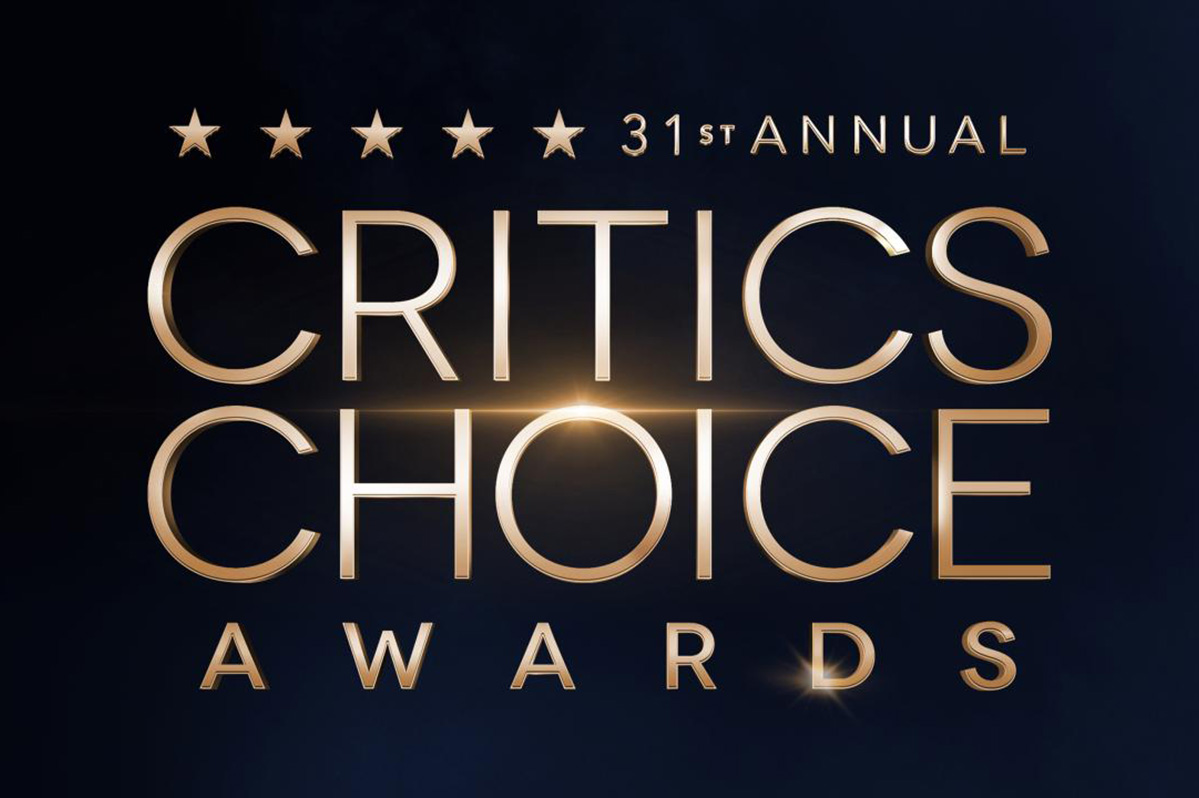
From Chelsea Handler shouting out Heated Rivalry in her opening monologue to Amy Madigan proving that horror performances can (and should) be taken seriously, the Critics Choice Awards provided plenty of iconic moments for queer movie fans to celebrate on the long road to Oscar night.
Handler kicked off the ceremony by recapping the biggest moments in pop culture last year, from Wicked: For Good to Sinners. She also made room to joke about the surprise hit TV sensation on everyone’s minds: “Shoutout to Heated Rivalry. Everyone loves it! Gay men love it, women love it, straight men who say they aren’t gay but work out at Equinox love it!”
The back-to-back wins for Jacob Elordi in Frankenstein and Amy Madigan in Weapons are notable, given the horror bias that awards voters typically have. Aunt Gladys instantly became a pop culture phenomenon within the LGBTQ+ community when Zach Cregger’s hit horror comedy released in August, but the thought that Madigan could be a serious awards contender for such a fun, out-there performance seemed improbable to most months ago. Now, considering the sheer amount of critics’ attention she’s received over the past month, there’s no denying she’s in the running for the Oscar.
“I really wasn’t expecting all of this because I thought people would like the movie, and I thought people would dig Gladys, but you love Gladys! I mean, it’s crazy,” Madigan said during her acceptance speech. “I get [sent] makeup tutorials and paintings. I even got one weird thing about how she’s a sex icon also, which I didn’t go too deep into that one.”
Over on the TV side, Rhea Seehorn won in the incredibly competitive best actress in a drama series category for her acclaimed performance as Carol in Pluribus, beating out the likes of Emmy winner Britt Lower for Severance, Carrie Coon for The White Lotus, and Bella Ramsey for The Last of Us. Pluribus, which was created by Breaking Bad’s showrunner Vince Gilligan, has been celebrated by audiences for its rich exploration of queer trauma and conversion therapy.
Jean Smart was Hack’s only win of the night, as Hannah Einbinder couldn’t repeat her Emmy victory in the supporting actress in a comedy series category against Janelle James, who nabbed a trophy for Abbott Elementary. Hacks lost the best comedy series award to The Studio, as it did at the Emmys in September. And in the limited series category, Erin Doherty repeated her Emmy success in supporting actress, joining in yet another Adolescence awards sweep.
As Oscar fans speculate on what these Critics Choice wins mean for future ceremonies, we have next week’s Golden Globes ceremony to look forward to on Jan. 11.
a&e features
Looking back at the 10 biggest A&E stories of 2025
‘Wicked,’ Lady Gaga’s new era, ‘Sexy’ Bailey and more
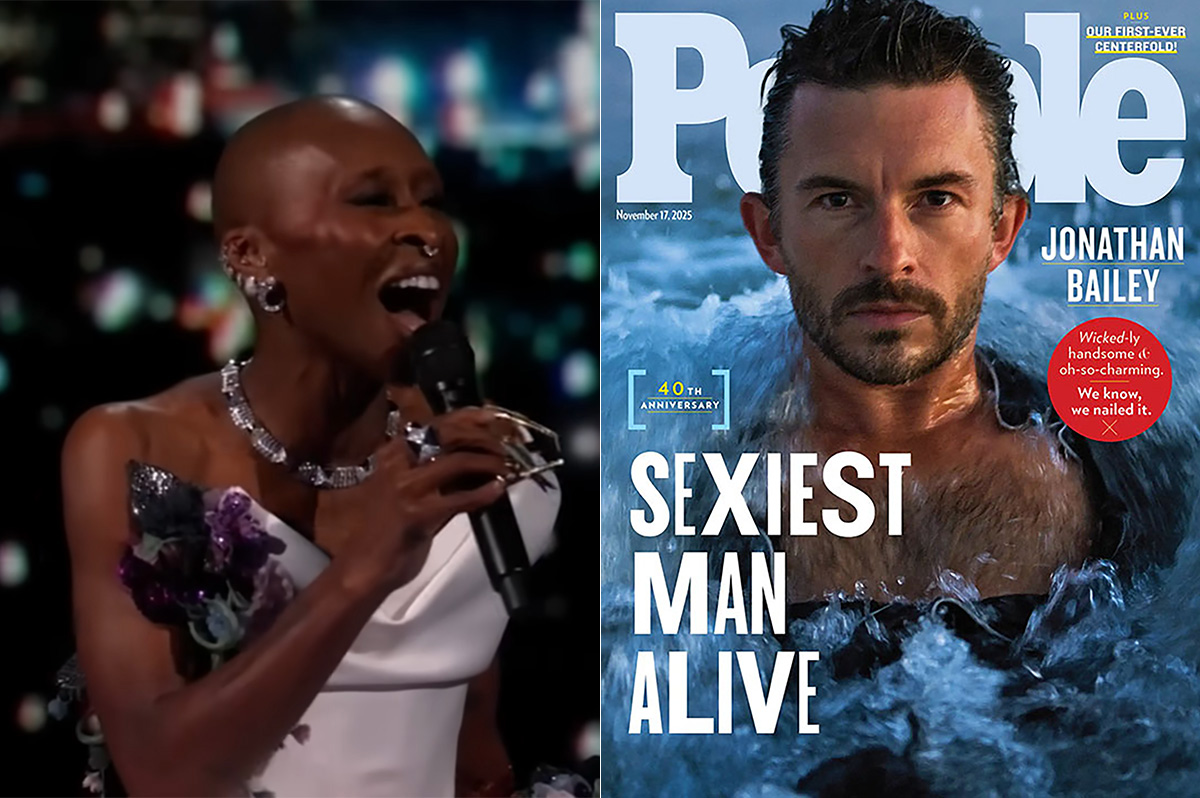
Although 2025 was a year marked by countless attacks on trans rights and political setbacks, the year also saw brilliant queer artists continuing to create art. From Cannes and Sundance Award winners now vying for Oscar consideration to pop icons entering new stages of their careers, queer people persevered to tell their stories through different media.
With the state of the world so uncertain, perhaps there’s no more vital time to celebrate our wins, as seen through some of this year’s top pop culture moments. While there’s no collection of 10 stories that fully encompass “the most important” news, here are some events that got the gays going:
10. ‘Mysterious Gaze of the Flamingo’ wins big at Cannes
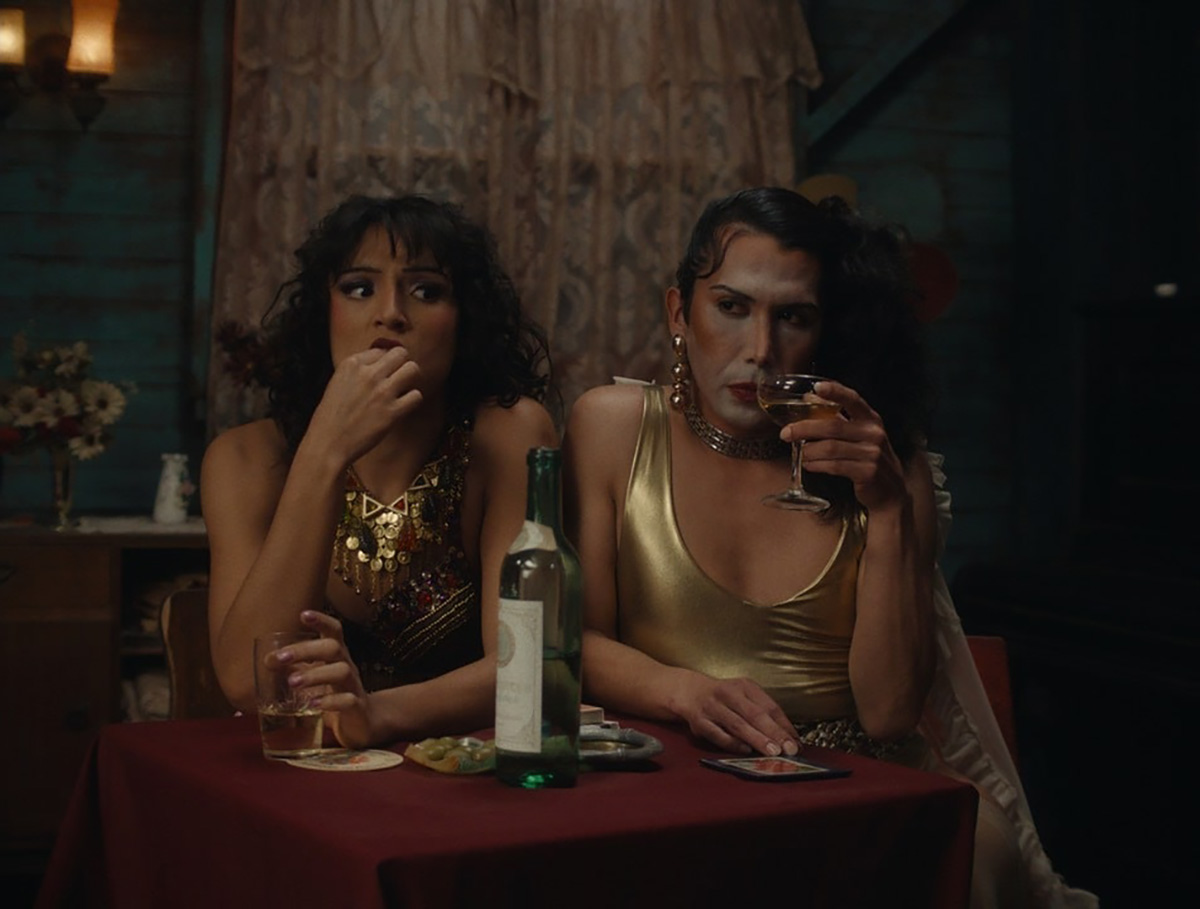
The Cannes Film Festival has become a crucial start for films hoping to make their way to the Oscars, and first-time director Diego Céspedes won the top Un Certain Regard prize for his intimate western “The Mysterious Gaze of the Flamingo.” The film is set in the ‘80s and is intended as an allegory for the AIDS epidemic. Seeing a film that unpacks vital queer history win one of the most coveted awards at Cannes has been a huge point of pride in the independent filmmaking community.
Since the film bowed at Cannes, it has been selected as Chile’s Oscar entry in the Best International Feature race. Speaking with The Blade during the film’s AFI Fest run in October, Céspedes said: At first, I was kind of scared to have this campaign position in the times that we’re living [in] here. But at the same time, I think the Oscars mean a huge platform — a huge platform for art and politics.”
9. ‘The Last of Us’ returns for an even gayer season 2
While the first season of The Last of Us gave us one of TV’s most heartbreaking queer love stories in the episode “Long, Long Time,” Season 2 doubled down on its commitment to queer storytelling with the blossoming relationship between Ellie (Bella Ramsey) and Dina (Isabela Merced). The show expanded on the pair’s relationship in the original video game, making it perhaps the central dynamic to the entire season. That unfortunately came with more homophobic backlash on the internet, but those who checked out all the episodes saw a tender relationship form amid the show’s post-apocalyptic, often violent backdrop. For their performance, Ramsey was once again nominated for an Emmy, but Merced deserved just as much awards attention.
8. ‘Emilia Pérez’ sparks controversy
Jacques Audiard’s genre-bending trans musical “Emilia Pérez” proved to be an awards season juggernaut this time last year, winning the Golden Globe for Best Musical/Comedy. But when the lead star Karla Sofia Gascón’s racist, sexist, and homophobic old tweets resurfaced, the film’s Oscar campaign became a tough sell, especially after Netflix had tried so hard to sell Emilia Pérez as the “progressive” film to vote for. Mind you, the film had already received significant backlash from LGBTQ+ audiences and the Mexican community for its stereotypical and reductive portrayals, but the Gascón controversy made what was originally just social media backlash impossible to ignore. The only person who seemed to come out of the whole debacle unscathed was Zoe Saldaña, who won the Oscar for Best Supporting Actress over Ariana Grande.
7. ‘Sorry, Baby’ establishes Eva Victor as major talent
Back in January at the Sundance Film Festival, Eva Victor (known by many for her brand of sketch comedy) premiered their directorial debut “Sorry, Baby” to rave reviews, even winning the Waldo Salt Screening Award. Victor shadowed Jane Schoenbrun on the set of “I Saw the TV Glow,” and seeing Victor come into their own and establish such a strong voice immediately made them one of independent cinema’s most exciting new voices. A memorable scene in the film sees the main character, Agnes (played by Victor), struggling to check a box for male or female, just one example of how naturally queerness is woven into the fabric of the story.
Most recently, Victor was nominated for a Golden Globe for her performance in the film, and she’s represented in a category alongside Jennifer Lawrence (“Die My Love”), Jessie Buckley (“Hamnet”), Julia Roberts (“After the Hunt”), Renate Reinsve (“Sentimental Value”) and Tessa Thompson (“Hedda”). The film also received four Independent Spirit Award nominations overall.
6. Paul Reubens comes out in posthumous doc
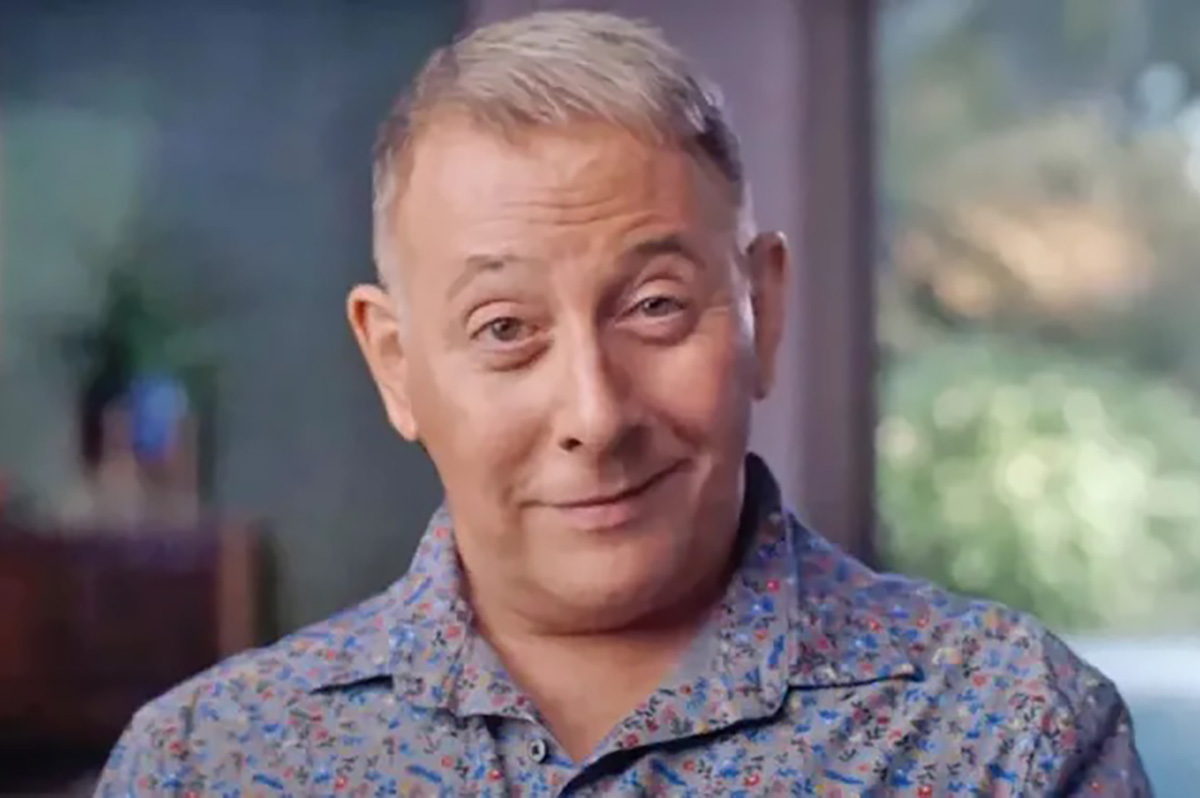
While Paul Reubens never publicly came out as gay before passing away in 2023, the two-part documentary “Pee-wee as Himself” premiered back in May on HBO Max, giving the legendary comedian a chance to posthumously open up to the world. Directed by Matt Wolf, the documentary explores how Reubens found his alter ego Pee-Wee Herman and why he kept his private life private.
The documentary won an Emmy in the Outstanding Documentary or Nonfiction Special category and remains one of the most critically acclaimed titles of the year with a 100% Rotten Tomatoes score. Also worth noting, the National Geographic documentary Sally told the posthumous coming out story of Sally Ride through the help of her long-time partner, Tam O’Shaughnessy.
5. Lady Gaga releases ‘Mayhem’
Lady Gaga entered a new phase of her musical career with the release of Mayhem, her seventh album to date. From the frenzy-inducing pop hit Abracadabra to the memorable Bruno Mars duet featured on “Die With a Smile,” seeing Gaga return to her roots and make an album for the most die-hard of fans was especially rewarding after the underwhelming film releases of “House of Gucci” and “Joker: Folie à Deux.” Gaga has been touring with The Mayhem Ball since July, her first arena tour since 2018. She even extended her tour into 2026 with more North American dates, so the party isn’t stopping anytime soon. And Gaga is even set to make an appearance next May in “The Devil Wears Prada 2.”
4. Cynthia Erivo, Ariana Grande perform at the Oscars
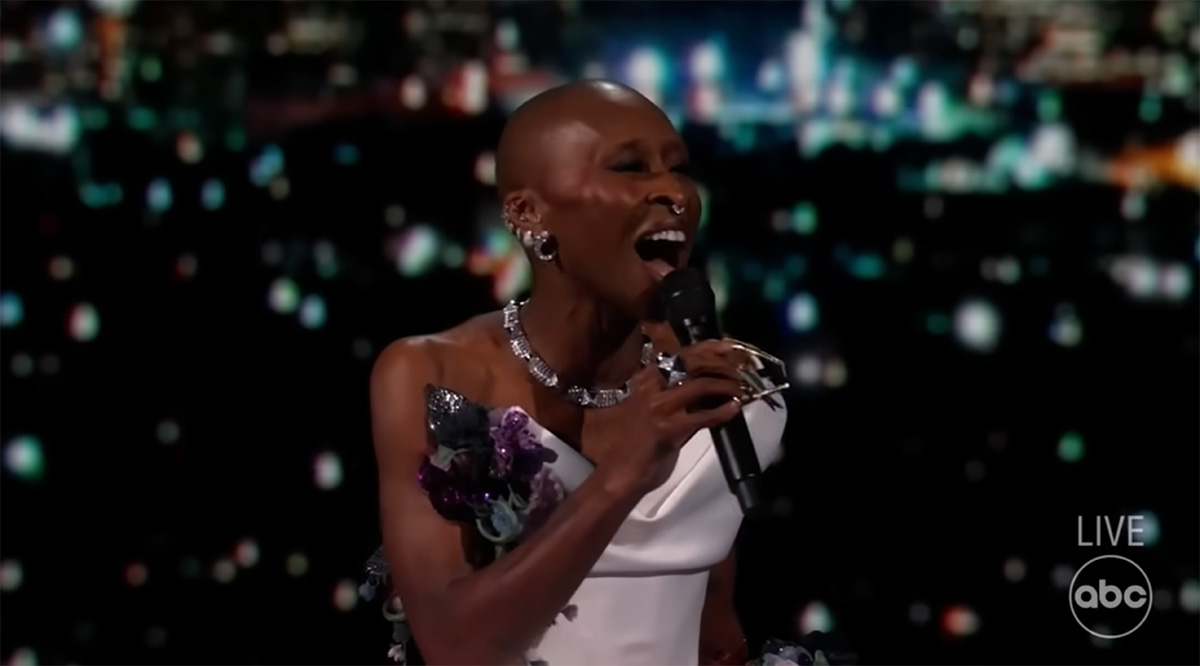
While “Wicked: For Good” didn’t quite reach the heights of the first film, we will forever have Cynthia Erivo and Ariana Grande’s breathtaking live performance that opened the 97th Academy Awards. The pair sang a rendition of “Over the Rainbow,” “Home,” and “Defying Gravity,” paying proper homage to the original 1939 “Wizard of Oz.” Even non-Wicked fans can’t deny how magical and brilliantly staged this performance was. With both Erivo and Grande up for acting Oscars last year, they’re hoping to repeat success and make history with consecutive nominations. Either way, let’s hope there’s another live performance in the making, especially with two new original songs (The Girl in the Bubble and No Place Like Home) in the mix.
3. Indya Moore speaks out against Ryan Murphy
Indya Moore has consistently used social media as a platform for activism, and in September, posted a 30-minute Instagram live speaking out against “Pose” co-creator Ryan Murphy. Moore claimed that Murphy wasn’t being a true activist for trans people. “Ryan Murphy, we need you to do more. You need to address the racism, the violence, and the targeting of people on your productions, Ryan Murphy. You do need to make sure trans people are paid equally. Yes, Janet did the right thing,” Moore said. Murphy was also back in the headlines this year for the critically panned “All’s Fair” and the controversial “Monster: The Ed Gein Story” starring Laurie Metcalf and Charlie Hunnam.
2. Cole Escola wins Tony for Best Leading Actor
Few pop culture moments this year brought us together more than Cole Escola winning a Tony award for “Oh, Mary!” the Broadway show they created, wrote and starred in (we love a triple threat!) Escola made history by becoming the first nonbinary person to win a Tony in the leading actor category, and seeing them excitedly rush to the stage wearing a Bernadette Peters-inspired gown instantly became a viral social media moment.
The cherry on top of Escola’s major moment is the recent news that they are writing a Miss Piggy movie with Jennifer Lawrence and Emma Stone producing — news that also broke the internet for the better. We cannot wait!
1. Jonathan Bailey makes gay history as ‘Sexiest Man Alive’
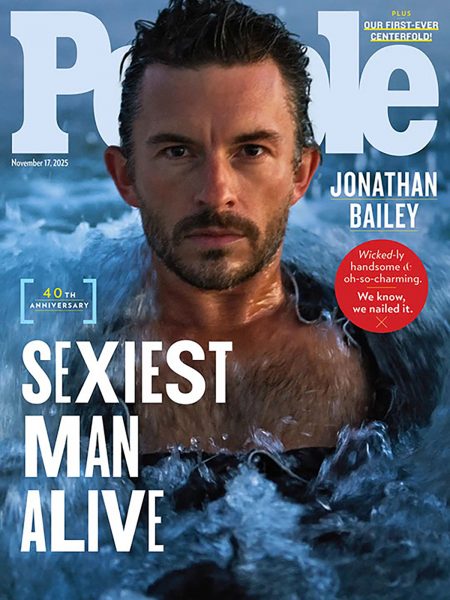
The same year as his on-screen roles in blockbusters “Jurassic World Rebirth” and “Wicked: For Good,” Jonathan Bailey made history as the first openly gay man to be named People magazine’s “Sexiest Man Alive.” The fact that it took 40 years for an openly gay man to earn the title is a signifier of how far we still have to go with queer representation, and seeing Bailey celebrated is just one small step in the right direction.
“There’s so many people that want to do brilliant stuff who feel like they can’t,” he told PEOPLE, “and I know the LGBT sector is under immense threat at the moment. So it’s been amazing to meet people who have the expertise and see potential that I could have only dreamed of.” In 2024, Bailey founded the charity titled The Shameless Fund, which raises money for LGBTQ+ organizations.
-

 Theater5 days ago
Theater5 days agoFord’s ‘First Look’ festival showcases three new productions
-

 Bars & Parties5 days ago
Bars & Parties5 days agoMid-Atlantic Leather kicks off this week
-

 U.S. Supreme Court3 days ago
U.S. Supreme Court3 days agoSupreme Court hears arguments in two critical cases on trans sports bans
-

 Photos5 days ago
Photos5 days agoPHOTOS: ‘ICE Out For Good’ Sunday protests

